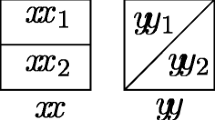Abstract
This study is in two parts. In the first part, various important principles of classical extensional mereology are derived on the basis of a nice axiomatization involving ‘part of’ and fusion. All results are proved here with full Fregean (and Gentzenian) rigor. They are chosen because they are needed for the second part. In the second part, this natural-deduction framework is used in order to regiment David Lewis’s justification of his Division Thesis, which features prominently in his combination of mereology with class theory. The Division Thesis plays a crucial role in Lewis’s informal argument for his Second Thesis in his book Parts of Classes. In order to present Lewis’s argument in rigorous detail, an elegant new principle is offered for the theory that combines class theory and mereology. The new principle is called the Canonical Decomposition Thesis. It secures Lewis’s Division Thesis on the strong construal required in order for his argument to go through. The exercise illustrates how careful one has to be when setting up the details of an adequate foundational theory of parts and classes. The main aim behind this investigation is to determine whether an anti-realist, inferentialist theorist of meaning has the resources to exhibit Lewis’s argument for his Second Thesis—which is central to his marriage of class theory with mereology—as a purely conceptual one. The formal analysis shows that Lewis’s argument, despite its striking appearance to the contrary, can be given in the constructive, relevant logic IR. This is the logic that the author has argued, elsewhere, to be the correct logic from an anti-realist point of view. The anti-realist is therefore in a position to regard Lewis’s argument as purely conceptual.
Similar content being viewed by others
References
Dummett M. (1977) Elements of Intuitionism. Clarendon Press, Oxford
Dummett M. (1978) Truth and Other Enigmas. Duckworth, London
Dummett M. (1991) The Logical Basis of Metaphysics. Harvard University Press, Cambridge, MA
Leonard H. S., Goodman N. (1940) The calculus of individuals and its uses. The Journal of Symbolic Logic 5(2): 45–55
Lesniewśki, S. (1983). O podstawach matematyki. Przeglad Filozoficzny, Jahrbuch 30. Heft II-III, 1927; abridged version translated into English by Vito F. Sinisi as ‘On the Foundations of Mathematics’, in Topoi 2 (1983) 7–52.
Lewis D. (1991) Parts of Classes. Basil Blackwell, Oxford
Lewis D. (1993) Mathematics is megethology. Philosophia Mathematica 1: 3–23
Lewis D. K. (1998) Papers in Philosophical Logic. Cambridge University Press, Cambridge, NY
Prawitz D. (1974) On the idea of a general proof theory. Synthese 27: 63–77
Prawitz D. (1977) Meaning and proofs: On the conflict between classical and intuitionistic logic. Theoria 43: 2–40
Simons P. (1987) Parts: A study in ontology. Oxford University Press, Oxford
Simons P. (2006) Real wholes, real parts: Mereology without algebra. Journal of Philosophy 103(12): 597–613
Tennant N. (1978) Natural Logic. Edinburgh University Press, Edinburgh
Tennant N. (1987) Anti-Realism and Logic: Truth as eternal. Oxford University Press, Oxford
Tennant N. (1997) The Taming of the True. Oxford University Press, Oxford
Tennant N. (2003) Review essay on Bob Hale and Crispin Wright, The Reason’s Proper Study. Philosophia Mathematica 11(2): 226–241
Tennant N. (2004) A general theory of abstraction operators. The Philosophical Quarterly 54(214): 105–133
Tennant, N. (2008). Natural logicism via the logic of orderly pairing. In S. Lindström, E. Palmgren, K. Segerberg, and V. Stoltenberg-Hansen (Eds.), Logicism, Intuitionism, Formalism: What has become of them? (pp. 91–125). Dordrecht: Synthese Library, Springer.
Author information
Authors and Affiliations
Corresponding author
Additional information
This paper was accepted for presentation at the SAC conference on David Lewis’s contributions to formal philosophy, held in Copenhagen in September 2007, but, in the event, the author was unable to attend. The paper was submitted for the proceedings immediately after the conference was held; this is its first publication. The author offers this study as a tribute to the legacy of David’s unfailingly rigorous but catholic intellect, and in grateful memory of particularly helpful and encouraging philosophical conversations with David during his annual visits to Australia in the late eighties and early nineties. Thanks are owed to Gabriel Uzquiano for helpful correspondence that was a stimulus to this project. Ben Caplan provided detailed comments on an earlier version, which helped avert a formal error. Comments by Kevin Scharp and Nicholaos Jones led to improvements in exposition. Salvatore Florio gave two later versions particularly eagle-eyed attention, uncovering errors of composition in some of the formal derivations. Fred Muller kindly provided some \({\text{\LaTeX}}\) codes for mereological symbols. The author is solely responsible for any errors that remain.
Rights and permissions
About this article
Cite this article
Tennant, N. Parts, classes and Parts of Classes: an anti-realist reading of Lewisian mereology. Synthese 190, 709–742 (2013). https://doi.org/10.1007/s11229-012-0200-1
Received:
Accepted:
Published:
Issue Date:
DOI: https://doi.org/10.1007/s11229-012-0200-1




